英语代词详解
- 格式:doc
- 大小:316.00 KB
- 文档页数:30
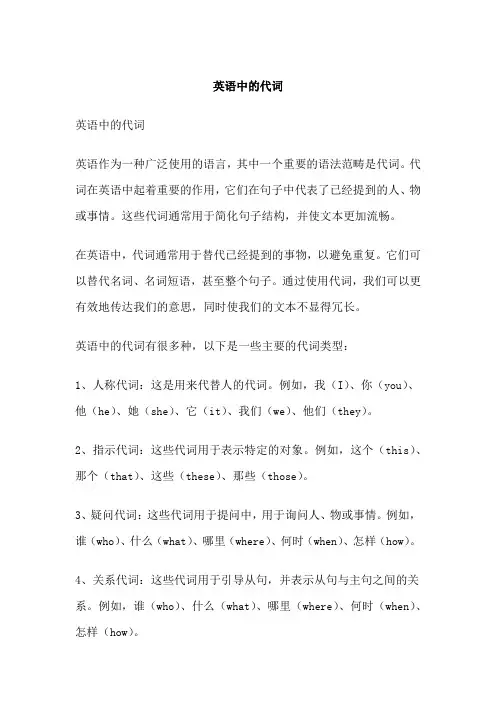
英语中的代词英语中的代词英语作为一种广泛使用的语言,其中一个重要的语法范畴是代词。
代词在英语中起着重要的作用,它们在句子中代表了已经提到的人、物或事情。
这些代词通常用于简化句子结构,并使文本更加流畅。
在英语中,代词通常用于替代已经提到的事物,以避免重复。
它们可以替代名词、名词短语,甚至整个句子。
通过使用代词,我们可以更有效地传达我们的意思,同时使我们的文本不显得冗长。
英语中的代词有很多种,以下是一些主要的代词类型:1、人称代词:这是用来代替人的代词。
例如,我(I)、你(you)、他(he)、她(she)、它(it)、我们(we)、他们(they)。
2、指示代词:这些代词用于表示特定的对象。
例如,这个(this)、那个(that)、这些(these)、那些(those)。
3、疑问代词:这些代词用于提问中,用于询问人、物或事情。
例如,谁(who)、什么(what)、哪里(where)、何时(when)、怎样(how)。
4、关系代词:这些代词用于引导从句,并表示从句与主句之间的关系。
例如,谁(who)、什么(what)、哪里(where)、何时(when)、怎样(how)。
5、不定代词:这些代词用于表示不确定的或未知的人、物或事情。
例如,一个(a)、一些(some)、任何(any)、每个人(everyone)。
正确地使用代词可以帮助我们创建清晰、易于理解的文本。
也需要注意不要误用或错用代词,以免引起混淆或误解。
总的来说,英语中的代词是一个重要的语言工具,可以帮助我们更好地表达自己的意思。
小学英语语法代词小学英语语法代词:介绍、用法和注意事项在英语学习过程中,代词起着非常重要的作用。
尤其是对于小学生,掌握代词的用法能够更好地理解和运用英语。
本文将为大家介绍小学英语语法中的代词,包括其特点、用法和注意事项,以帮助孩子们更准确地使用英语。
一、代词的种类和特点在小学英语语法中,常见的代词有:人称代词、物主代词、反身代词、指示代词和不定代词等。
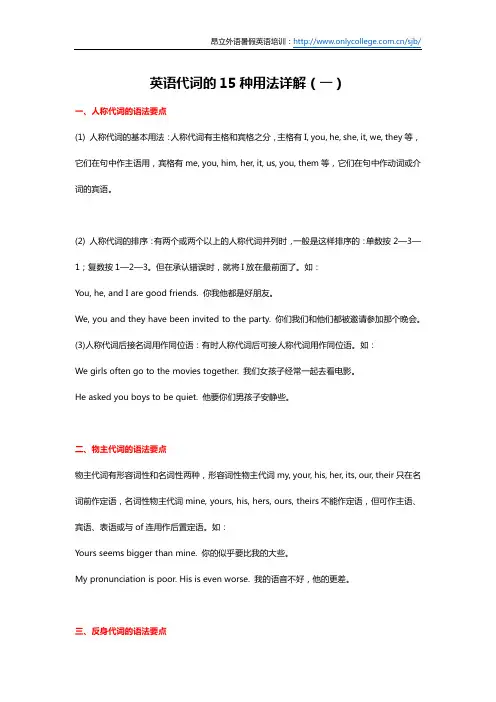
英语代词的15种用法详解(一)一、人称代词的语法要点(1) 人称代词的基本用法:人称代词有主格和宾格之分,主格有I, you, he, she, it, we, they等,它们在句中作主语用,宾格有me, you, him, her, it, us, you, them等,它们在句中作动词或介词的宾语。
(2) 人称代词的排序:有两个或两个以上的人称代词并列时,一般是这样排序的:单数按2—3—1;复数按1—2—3。
但在承认错误时,就将I放在最前面了。
如:You, he, and I are good friends. 你我他都是好朋友。
We, you and they have been invited to the party. 你们我们和他们都被邀请参加那个晚会。
(3)人称代词后接名词用作同位语:有时人称代词后可接人称代词用作同位语。
如:We girls often go to the movies together. 我们女孩子经常一起去看电影。
He asked you boys to be quiet. 他要你们男孩子安静些。
二、物主代词的语法要点物主代词有形容词性和名词性两种,形容词性物主代词my, your, his, her, its, our, their只在名词前作定语,名词性物主代词mine, yours, his, hers, ours, theirs不能作定语,但可作主语、宾语、表语或与of连用作后置定语。
如:Yours seems bigger than mine. 你的似乎要比我的大些。
My pronunciation is poor. His is even worse. 我的语音不好,他的更差。
三、反身代词的语法要点(1) 反身代词的基本用法:反身代词有myself, yourself, himself, herself, itself, ourselves, yourselves, themselves等。

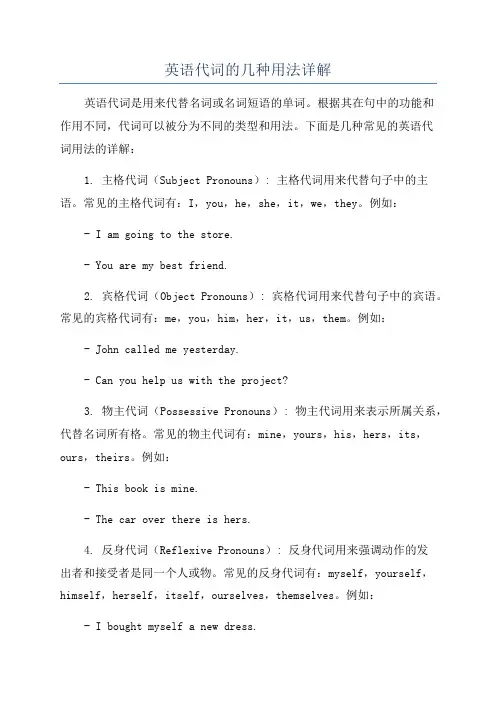
英语代词的几种用法详解英语代词是用来代替名词或名词短语的单词。
根据其在句中的功能和作用不同,代词可以被分为不同的类型和用法。
下面是几种常见的英语代词用法的详解:1. 主格代词(Subject Pronouns): 主格代词用来代替句子中的主语。
常见的主格代词有:I,you,he,she,it,we,they。
例如:- I am going to the store.- You are my best friend.2. 宾格代词(Object Pronouns): 宾格代词用来代替句子中的宾语。
常见的宾格代词有:me,you,him,her,it,us,them。
例如:- John called me yesterday.- Can you help us with the project?3. 物主代词(Possessive Pronouns): 物主代词用来表示所属关系,代替名词所有格。
常见的物主代词有:mine,yours,his,hers,its,ours,theirs。
例如:- This book is mine.- The car over there is hers.4. 反身代词(Reflexive Pronouns): 反身代词用来强调动作的发出者和接受者是同一个人或物。
常见的反身代词有:myself,yourself,himself,herself,itself,ourselves,themselves。
例如:- I bought myself a new dress.- She hurt herself while playing basketball.5. 相互代词(Reciprocal Pronouns): 相互代词用来表示两个或多个人或物之间的相互关系。
常见的相互代词有:each other,one another。
例如:- They love each other.- The students helped one another to solve the math problems.6. 关系代词(Relative Pronouns): 关系代词用来引导定语从句,并在从句中作为主语、宾语或介词宾语。
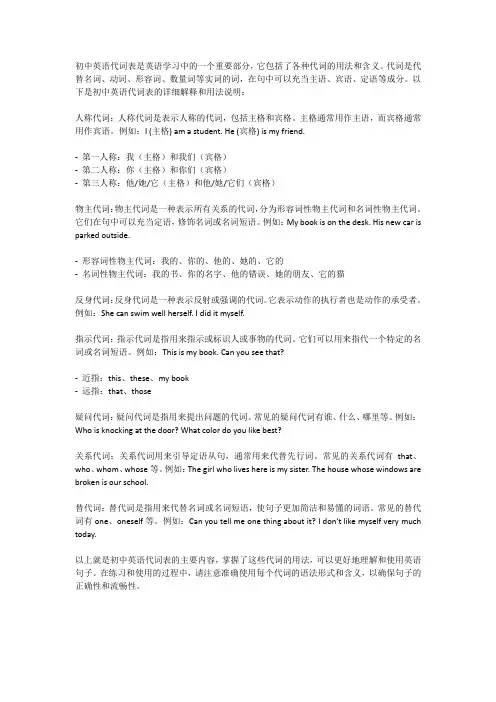
初中英语代词表是英语学习中的一个重要部分,它包括了各种代词的用法和含义。
代词是代替名词、动词、形容词、数量词等实词的词,在句中可以充当主语、宾语、定语等成分。
以下是初中英语代词表的详细解释和用法说明:人称代词:人称代词是表示人称的代词,包括主格和宾格。
主格通常用作主语,而宾格通常用作宾语。
例如:I (主格) am a student. He (宾格) is my friend.-第一人称:我(主格)和我们(宾格)-第二人称:你(主格)和你们(宾格)-第三人称:他/她/它(主格)和他/她/它们(宾格)物主代词:物主代词是一种表示所有关系的代词,分为形容词性物主代词和名词性物主代词。
它们在句中可以充当定语,修饰名词或名词短语。
例如:My book is on the desk. His new car is parked outside.-形容词性物主代词:我的、你的、他的、她的、它的-名词性物主代词:我的书、你的名字、他的错误、她的朋友、它的猫反身代词:反身代词是一种表示反射或强调的代词。
它表示动作的执行者也是动作的承受者。
例如:She can swim well herself. I did it myself.指示代词:指示代词是指用来指示或标识人或事物的代词。
它们可以用来指代一个特定的名词或名词短语。
例如:This is my book. Can you see that?-近指:this、these、my book-远指:that、those疑问代词:疑问代词是指用来提出问题的代词。
常见的疑问代词有谁、什么、哪里等。
例如:Who is knocking at the door? What color do you like best?关系代词:关系代词用来引导定语从句,通常用来代替先行词。
常见的关系代词有that、who、whom、whose等。
例如:The girl who lives here is my sister. The house whose windows are broken is our school.替代词:替代词是指用来代替名词或名词短语,使句子更加简洁和易懂的词语。



代词用法详解,分不清代词类型的你,需要这个!英语中的代词,按其意义、特征及在句中的作用分为:人称代词、物主代词、指示代词、反身代词、相互代词、疑问代词、关系代词和不定代词等等。
今天我们主要学习小学英语中常用到的“人称代词”和“物主代词”的用法。
一、人称代词表示“我”、“你”、“他”、“她”、“它”、“我们”、“你们”、“他们”的词,叫做人称代词。
人称代词有人称、数和格的变化,见下表1、主格:句中做主语,一般用在动词前(疑问句除外)。
例:I have a dog.I am from China.我来自中国。
We are good friends.我们是好朋友。
They help me a lot2、宾格:在句中做宾语,多用于动词、介词后。
例:Mr.Wang teaches us English.王老师教我们英语。
Let me help you.让我来帮你。
What’s wrong with him ?他怎么了?3. 两个或两个以上的人称代词并列作主语时,排列顺序为:单数人称二、三、一,复数人称一、二、三。
例如:You ,she and I are good friends.我,你和她都是好朋友。
We,you and they all like music.我们,你们和他们都喜欢音乐。
4.当I与其他词语一起并列作主语时,I要放在后面,但承认错误时,I要放在前面。
例如:She and I are in the same school.她和我在同一个学校。
I and he make mistakes.我和他犯了错误。
人称代词用法口诀人称代词主宾格,作用不同莫用错。
主格动词前做主,动词介词后宾格。
You和it主宾同,其他主宾须分清。
人称代词并列现,尊重他人礼当先。
单数人称二三一,复数人称一二三。
若把错误责任担,第一人称我靠前。
二、物主代词1、形容词性物主代词:作用相当于形容词,放在名词前面例:my dog/ our teacher / his son / its eyes2、名词性物主代词:作用相当于一个名词例:This is mine(=my thing). / My mother is as kind asyours(=your mother).3、物主代词的用法:形容词性物主代词起形容词的作用,在句中只能作定语,后面一定要跟一个名词;名词性物主代词相当于一个名词,不能用在名词之前,可单独使用,在句中可作主语、宾语、表语等。
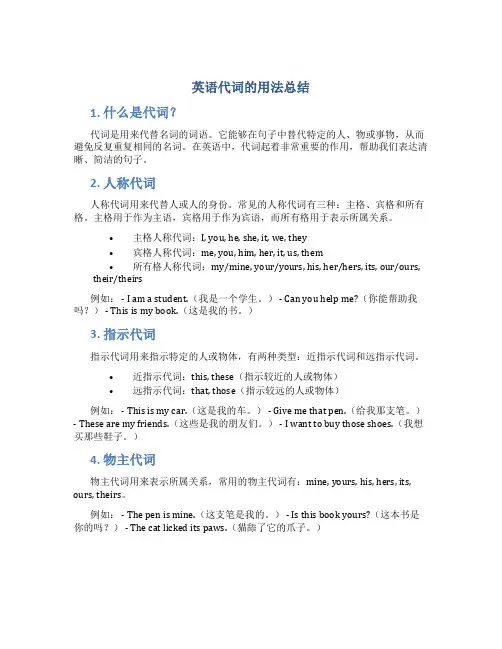
英语代词的用法总结1. 什么是代词?代词是用来代替名词的词语。
它能够在句子中替代特定的人、物或事物,从而避免反复重复相同的名词。
在英语中,代词起着非常重要的作用,帮助我们表达清晰、简洁的句子。
2. 人称代词人称代词用来代替人或人的身份。
常见的人称代词有三种:主格、宾格和所有格。
主格用于作为主语,宾格用于作为宾语,而所有格用于表示所属关系。
•主格人称代词:I, you, he, she, it, we, they•宾格人称代词:me, you, him, her, it, us, them•所有格人称代词:my/mine, your/yours, his, her/hers, its, our/ours, their/theirs例如: - I am a student.(我是一个学生。
) - Can you help me?(你能帮助我吗?) - This is my book.(这是我的书。
)3. 指示代词指示代词用来指示特定的人或物体,有两种类型:近指示代词和远指示代词。
•近指示代词:this, these(指示较近的人或物体)•远指示代词:that, those(指示较远的人或物体)例如: - This is my car.(这是我的车。
) - Give me that pen.(给我那支笔。
)- These are my friends.(这些是我的朋友们。
) - I want to buy those shoes.(我想买那些鞋子。
)4. 物主代词物主代词用来表示所属关系,常用的物主代词有:mine, yours, his, hers, its, ours, theirs。
例如: - The pen is mine.(这支笔是我的。
) - Is this book yours?(这本书是你的吗?) - The cat licked its paws.(猫舔了它的爪子。
)5. 反身代词反身代词用来强调动作的执行者和承受者是同一个人或物。
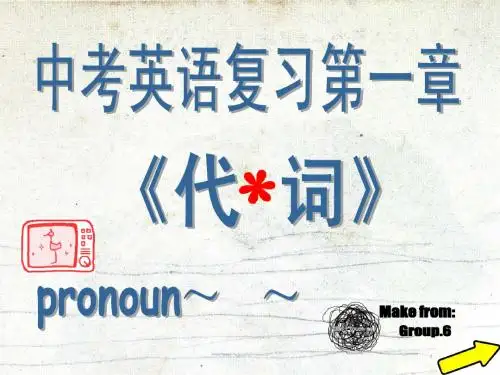
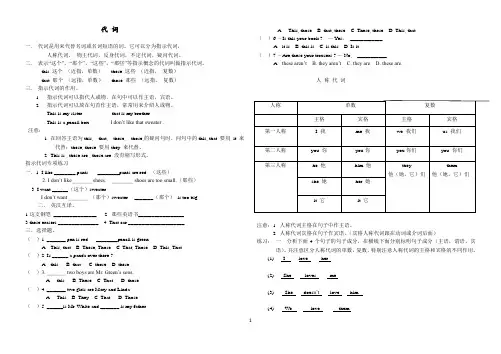
代词一.代词是用来代替名词或名词短语的词。
它可以分为指示代词,人称代词,物主代词,反身代词,不定代词,疑问代词。
二.表示“这个”,“那个”,“这些”,“那些”等指示概念的代词叫做指示代词。
this 这个(近指,单数)these 这些(近指,复数)that 那个(远指,单数)those 那些(远指,复数)三.指示代词的作用。
1.指示代词可以指代人或物,在句中可以作主语,宾语。
2.指示代词可以放在句首作主语,常常用来介绍人或物。
This is my sister . that is my brother.This is a pencil box . I don’t like that sweater .注意:1.在回答主语为this, that, these, those,的疑问句时,问句中的this, that 要用it 来代替;these, those 要用they 来代替。
2.This is , these are , those are 没有缩写形式。
指示代词专项练习一.1. I like ________ pants. ________pants are red. (这些)2. I don’t like _______ shoes. ________ shoes are too small.(那些)3. I want ______(这个)sweater.I don’t want _______ (那个)sweater. _______(那个)is too big.二.英汉互译。
1.这支钢笔________________2. 那些英语书_________________3.these erasers _______________4. That car _____________________三.选择题。
()1. _______ pen is red . ________pencil is green.A.This, thatB. These, ThoseC. That, ThoseD. This, That()2. Is ______ a panda over there ?A.thisB. thatC. thoseD. these()3. _______ two boys are Mr. Green’s sons.A.thisB. TheseC. ThatD. those()4. _______ two girls are Mary and Linda.A.ThisB. TheyC. ThatD. Those()5. ______is Mr. White and _______ is my father.A.This, thoseB. that, theseC. These, theseD. This, that()6. – Is this your book ? — Yes,____________A.it isB. this isC. is thisD. Is it()7. – Are these your trousers ? — No, ___________A.these aren’tB. they aren’tC. they areD. these are.人称代词注意:1. 人称代词主格在句子中作主语。
代词高考对代词的考查主要是人称代词、物主代词、反身代词、指示代词、不定代词、疑问代词和关系代词等;设置特定的语境,对代词的数、性、格的变化进行考查仍然是高考的热点;Ⅰ代词的分类1.人称代词:主格I, we, you, he, she, it, they宾格me, us, you, him, her, it, them2.物主代词:形容词性my, our, your, his, her, its, their名词性mine, ours, yours, his, hers, its, theirs3.反身代词:单数myself, yourself, himself, herself, itself复数ourselves, yourselves, themselves4.相互代词:each other 两者之间相互;one another 两者以上的相互5.指示代词:this, that, these, those6.疑问代词:who, whom, whose, which, what7.关系代词:who, whom, whose, that指人,which, that, as, whose 指物8.不定代词:all, each, either, neither, both, none, other, another, something, everything, nothing somebody, everybody, nobody someone, everyone, no one, many, much, few, less一、人称代词单数复数第一人称第二人称第三人称第一人称第二人称第三人称人主I you he,she,itwe you they称代词格宾格me you him,her,itus you them人称代词的用法1.人称代词的主格在句子中作主语或主语补足语;如:John waited a while but eventually he went home.约翰等了一会儿,最后他回家了; John hoped the passenger would be Mary and indeed it was she.说明:在复合句中,如果主句和从句主语相同,代词主语要用在从句中,名词主语用在主句中;When he arrived,John went straight to the bank.约翰一到就直接去银行了;2.人称代词的宾格在句子中作宾语或介词宾语,但在口语中也能作主语补语,第一人称在省略句中,还可以作主语;如:I saw her with them;at least,I thought it was her.第一个her作动词宾语,them作介词宾语,第二个her作表语—Who broke the vase谁打碎了花瓶—Me.我;3.人称代词之主、宾格的替换1宾格代替主格在简短对话中,当人称代词单独使用或在not 后,多用宾语;—I like English.;—Me too.—Have more wine—Not me.;在表示比较的非正式的文体中,常用宾格代替主格; 但如果比较状语的谓语保留,则主语只能用主格;He is taller than I/me. He is taller than I am.2主格代替宾格在介词but,except后,有时可用主格代替宾格;在电话用语中常用主格;—I wish to speak to Mary.;—This is she.注意:在动词be 或to be后的人称代词视其前面的名词或代词而定;I thought it was she.我以为是她;主格——主格I thought it to be her.宾格——宾格I was taken to be she.我被当成了她;主格——主格They took me to be her.他们把我当成了她;宾格——宾格4.代词的指代问题1不定代词anybody,everybody,nobody,anyone, someone, everyone,no one, 及whoever和person在正式场合使用时,可用he,his,him代替;如:Nobody came,did he2动物名词的指代一般用it或they代替,有时也用he,she,带有亲切的感情色彩;如:Give the cat some is hungry.;3指代车或国家,船舶的名词,含感情色彩时常用she;5.并列人称代词的排列顺序1单数人称代词并列作主语时,其顺序为:第二人称→ 第三人称→第一人称,即you→ he/she; it → I;如:You,he and I should return on time.你,他还有我应该按时回来;2复数人称代词作主语时,其顺序为:第一人称→ 第二人称→第三人称,即we→you→they;在下列情况中,第一人称放在前面;在承认错误,承担责任时;It was I and John that made her angry.是我和约翰惹她生气了;在长辈对晚辈,长官对下属说话时,如长官为第一人称,如:I and you try to finish it.并列主语只有第一人称和第三人称时;当其他人称代词或名词被定语从句修饰时;二、物主代词物主代词是表示所有关系的代词,也可叫做代词所有格;物主代词分形容性物主代词和名词性物主代词两种,其人称和数的变化见下表;单数复数第一人称第二人称第三人称第一人称第二人称第三人称物主代词形容词性my your his,her,its our your their名词性mine your shis,hers,its ours yours theirsOur school is here,and theirs is there.我们的学校在这儿,他们的在那儿;1.物主代词的用法1物主代词既有表示所属的作用又有指代作用;如:John had cut his finger; apparently there was a broken glass on his desk.2物主代词有形容词性my,your等和名词性mine,yours等两种,形容词性的物主代词属于限定词;名词性的物主代词在用法上相当于省略了中心名词的’s属格结构;如:Jack’s cap意为The cap is Jack’s;His cap意为The cap is his;2.名词性物主代词的句法功能1作主语;如:May I use your pen Yours works better.2作宾语;如:I love my motherland as much as you love yours.3作介词宾语;如:You should interpret what I said in my sense of the word,not inyours.4作表语;如:The life I have is ’s ’s yours.3.双重所有格物主代词不可与a,an,this,that,these,those,some,any,several,no,each,every,such,another,which等词一起前置,修饰一个名词,而必须用双重所有格;公式为:a,an,this,that+名词+of+名词性物主代词;三、指示代词指示代词表示“那个”“这个”“这些”“那些”等指示概念的代词;指示代词有this,that,these,those等;如:That is a good idea.指示代词的用法1.指示代词分单数this/that和复数these/those两种形式,既可作限定词又可作代词;2.指示代词的句法功能;1作主语;如:This is the way to do it.2作宾语;如:I like this better than that.3作表语;如:My point is this.4作介词宾语;如:I don’t say no to that.There is no fear of that.说明1:指示代词在作主语时可指物也可指人,但作其他句子成分时只能指物,不能指人;如:对That is my teacher.那是我的老师;that作主语,指人对He is going to marry this girl.他要和这个姑娘结婚;this作限定词错He is going to marry this.this作宾语时不能指人对I bought this.我买这个;this指物,可作宾语说明2:that和those可作定语从句的先行词,但this和these不能,同时,在作先行词时,只有those可指人,试比较:对He admired that which looked beautiful.对He admired those who looked beautiful.他赞赏那些外表漂亮的人;those 指人错He admired that who danced well.that 作宾语时不能指人对He admired those who danced well.他赞赏跳舞好的人;those 指人对He admired those which looked beautiful.他赞赏那些外表漂亮的东西;those指物四、反身代词表示“我自己”“你自己”“他自己”“我们自己”“你们自己”和“他们自己”等的代词,叫做自身代词,也称为“反身代词”;如:She was talking to herself.她自言自语;反身代词单数复数第一人称第二人称第三人称第一人称第二人称第三人称myself yourself himselfherselfitselfourselves yourselves themselves反身代词的用法1.作宾语,如1有些动词需有反身代词,如absent,bathe,amuse,blame,dry,cut,enjoy,hurt,introduce,behave等;如:We enjoyed ourselves very much last night.Please help yourself to some fish.2用于及物动词+宾语+介词,如:take pride in,be annoyed with,help oneself to sth 等;I could not dressmyselfup at that time.注:有些动词后不跟反身代词,如:get up,stand up,wake up等;Please sit down.2.用作表语;如;I am not myself today.3.用作同位语;如The thing itself is not important.4.在不强调的情况下,but,except,for 等介词后宾语用反身代词或人称代词宾格均可;注意:1反身代词本身不能单独作主语;错Myself drove the car.对I myself drove the car.我自己开车;2但在and,or,nor连接的并列主语中,第二个主语可用反身代词,特别是myself 作主语;Charles and myself saw it.查尔斯和我看见了这件事;五、相互代词表示相互关系的代词叫相互代词,有each other和one another两个词组;他们表示句中动词所叙述的动作或感觉在涉及的各个对象之间是相互存在的;如:It is easy to see that the people of different cultures have always copied each other.,相互借鉴的相互代词宾格each other,one another所有格each other’s,one another’s相互代词的句法功能1.作动词宾语;如:People should love one another.人们应当彼此相爱;2.可作介词宾语;Dogs bark,cocks crow,frogs croak to each other.犬吠、鸡鸣、蛙儿对唱;说明:传统语法认为,相互关系存在于两个人或物之间用each other, 存在于两个以上人和物之间用one another;现代英语中,两组词交替使用的实例也很多;He put all the books beside each other/one another.他把所有书并列摆放起来; Usually these small groups were independent of each other.这些小团体通常是相互独立的;3.相互代词可加’s构成所有格;如:The students borrowed each other’s notes.六、不定代词不是指明代替任何特定名词的代词叫做不定代词;常见的不定代词有all,both,each,every等,以及含有some,any,no等的合成代词,如anybody,something,no one;这些不定代词大都可以代替名词和形容词,在句中作主语、宾语、表语和定语,但none和由some,any,no等构成的复合不定代词只能作主语、宾语或表语;every 和no只能作定语;如:—Do you have a car— Yes,I have one.—I don’t know any of them.他们,Ⅱ代词的用法1. nothing, none, no onenone作为代词,最常用来表示数量,它可以是一个可数的概念how many也可以是一个不可数的概念how much,或者any引起的问题;而nothing是相对于something有某物什么都没有,它回答的是“What is in/on...”的问题;而no one=nobody没有人,它回答的是“Who did that”谁……或是anyone有没有人的问题;2. one, ones, that, those, it1one和ones可以用来代替前面提到过的可数名词,one代单数,ones代复数,其中:两者都可以指代物只要是可数one前面一般不加a,因为它本身有“一个”的意思,但如果one前面有形容词修饰,则需要加a/an;one可以单独使用,意思为“任何人”;例如:—Shall we have a rest—Didn’t we just have one因为one=a somethingOne should always believe in oneself.2that与those:that可以代替前面提到的不可数名词或可数名词单数相当于the one;而those 代替前面提到的复数名词,有时可以用the ones替换;例如:The population of China is bigger than that of India. that=the populationThe boy told his story and that of the girl next room.that=the storyThe cell phones we made nowadays are better than those/the ones made 2 years ago.those=the cell phones=the ones3one和it:两者都可以用来代替前面出现过的单数名词,one指这类东西中的任何一个,指类属,泛指;it指前面所指的同一物;例如:I need a pen to sign my name. Can I have one one =a pen I cannot find my new pen. Have you seen itit指那支新钢笔3. another, the other, other, others, the others1another和the other:两者都是“另一个”的意思,但数量上有区别:用another指两个以上的数量,而the other只指两个中的另一个,例如:He has three brothers, one is a teacher, another is a doctor and the third is an engineer.注:another除了可以作代词,还可以用作形容词;这里有必要区别another, the other和more的用法:①another:another表“另一个”时只跟可数名词单数,而表“另外的、额外的、附加的”时,可跟带有few或具体数字的复数名词,此时可把“数词+复数名词”看作是一个整体;例如:—Have you finished your report yet—No,I will finish it in another 10 minutes.There is room for another few people in the back of the bus.②other:表“另外的”接复数名词,如与具体数词连用,则置于数词之后,但与定冠词the连用时,other要放在数词前;例如:Tony is going camping with two other little boys next Sunday.Do you know where he found the other two photos③more:more一般位于数词之后,名词之前,有时也可置于名词之后;例如:One more stepOne step more,and I’ll shoot you.Where shall we be in ten more yearsmore除跟数词外,还可与many, a little,a few,a lot,several等词连用,例如:There are many more dictionaries on the desk.Would you like some more tea2 others, the othersothers是相对于some来说的:some...some....others... 一些……一些……另一些……是泛指;而the others是特指另一些,相对于ones 可以理解为one, the other 的复数;例如:Class 1 are cleaning the classroom. Some are sweeping the floor, some are cleaning the window, and others are washing the blackboard. 泛指There are only 20 students in the classroom, where are the others.特指4. both, other, neither, each, any, allboth:两者都,谓语动词用复数;either:两者中间的任何一个,谓语动词用单数;neither:两者中间无任何一个,谓语动词多用单数,也可以用复数;each:两个或两个以上中的每一个,谓语动词用单数;any:三者或三者以上中的任何一个,谓语动词用单数;all:三者或三者以上全部;5. some, any, nosome属于肯定词,主要用于肯定句中,但当说话人期待肯定回答时,也可以用于疑问句中;例如:Could I have some more tea, please Would you like some more coffeeany属于非肯定词,主要用于否定句、疑问句或条件句中;它可以与形容词的比较级连用;例如:Don’t come any closer,or I’ll shootno属于否定词,用于否定句中:no+可数名词单数=not a/an no+可数名词复数=not any;例如:There is no such thing as a free lunch in the world.考点诠释纵观历年高考试题,代词的主要考点主要集中在以下几个方面:不定代词one,the one,ones,the ones;物主代词的用法;人称代词主格和宾格的用法;表示两者和多者的不定代词的比较;指示代词this,that,these,those,it的用法;another,theothers,else;the rest的用法;every-,some-,any-,no-与-thing,-one,-body构成的复合不定代词的用法;考点1 人称代词一般地说人称代词作主语时用主格;作宾语时用宾格;作定语时用形容词性物主代词;名词性物主代词可以代替“形容词性物主代词+名词”;但口语中,在无动词的句子里,往往用代词的宾格形式;1.用于无谓语的句子中一Dpes any of you know why Jack hasn’t come yet一Me.;答语如果带谓语,就得用主格,如:I can.和I do,too./So do I.2.表示惊奇、猜疑、反问、不满、厌烦等①Do you have good eyesight,young man一MeI can see a sparrow two hundred paces away.②WhatMe fight a big chap like himNot me3.代替as,than等连词之后的主格多用于口语中,尤其用于句末①I’m not as tall as himhe.;②She is much more careful than meI.她比我细心得多;当这类人称代词带有all,both等同位语时,用宾格的形式就更为常见了;如:He works harder than us a11.典例:Our neighbers gave a baby bird yesterday that hurt when it fell from its nest. A.us;it B.us;itself C.ourselves;itself D.ourselves;it考点2指不代词1.this/these,that/thosethis,these指代下面要说的内容;that,those指代上面陈述过的内容;如:①What I’d like to say about how to improve our spoken English is like this.②That’s a11.Thank you.③Salaries are higher here than those inmy hometown.2.一些习惯说法中this和that的用法比较固定①Who’s that你是谁②This is Mary.③11at’s all right/OK.;对感谢的答语④nat’S nothing.;对道歉的答语‘⑤That’s that.表示决定不能更改⑥That’S a11.就这些了;⑦That is…那就是……3.this,that有时可以用作副词,意为“这么,那么”,用在形容词或副词前作状语,表示程度It isn’t that cold.还没那么冷;考点3不定代词以下是几组易混不定代词:1.some类不定代词与any类不定代词1some类不定代词多用于肯定句中;any类的多用于疑问句、否定句和条件状语从句中;如:Raise your hands if you have any questions.如果你们有问题,请举手;2但在表示客气的请求或希望对方给予肯定回答的疑问句中,要用some类的不定代词;如:Would you like something to drink你要喝点什么吗3any类的不定代词用在肯定句中,表示“任何一个;任何事情;无论什么”;如:She promised that she could do anything for you.她许诺能为你做任何事情;2.all,both,neither,none1all指三者或三者以上“都”,both指两者“都”;如:①Bothofhis hands were wounded.②Allofhis fingers were wounded.2neither表示“两个都不”,常和of连用,放在带有冠词、物主代词或指示代词的复数名词之前,作主语时,谓语动词可以用单数或复数;none表示三个或三个以上“都不”,可用于人,也可用于物,后可接of短语,与复数名词、代词或单数集合名词连用作主语,指人时,谓语动词用单、复数皆可;指物时,只用第三人称单数形式;如:①Neither of the twins is/are cor rect.②None of us has/have ever been to the Great wall.3.any,either,each,every1any一般用于否定句、疑问句和条件句中;也可用在肯定句中,以加强语气,表示“任一”的概念;还可以用来修饰可数名词单数,表示三者或三者以上中的“任何一个”;如:I didn’t eat any meat.我一点儿肉也没吃;4.no,none,nothing,nobody1no不能单独使用,相当于not a或not any,作定语修饰可数名词或不可数名词;如:You have no sympathy for the sufferings of others.你对别人的痛苦没有同情心;2none既可以指人,也可以指物,侧重指三者或三者以上的人或物,用于回答how many/much引导的疑问句,可与介词of连用;如:①None of the books is suitable for the young.这些书都不适合年轻人读;②一How many people are there in the room一None.没人;3nobody指人,用于回答who引导的疑问句;nothing指物,用于回答what引导的疑问句;如:一Who is in the room谁在屋内一Nobody.没有人;5.it,one,ones, that和those1it特指上文所提到的同一个物,它所代替的名词常由the,this,that等修饰;one指上文提到的同类事物中的一个,不特指,被指代的名词通常由不定代词some或any修饰;如:①Where is that bookI can’t find it.那本书在哪儿我找不到它;②I haven’t got any erasers.Will you please give me one我没有橡皮,请你给我一块好吗(2)one与that都可用来代替上文中出现的名词,one前要用定冠词the,有时that和the one可互换使用;如:The book isn’t so interesting as the one/that you borrowed.3但that和one在多数情况下是不能互换的,主要区别在于:that既可代替可数名词,也可代替不可数名词,常要求有后置定语,一般不指人,复数形式为those;one只能代替可数名词单数,复数形式为ones;当可数名词前有形容词修饰时,只能用one,不用that;当of短语作可数名词的后置定语时,用that,不用one;如:①The best cigarettes are those from Yunnan.②The boy told me his story and that of the girl next door.Your coat is blue,and my new one is green.你的大衣是蓝色的,我的新大衣是绿色的;4the ones用来代替上文提到的特指的复数名词,有时可以用those代替,尤其在有后置定语的情况下;如:The books on the desk are better than those/the ones under the desk.6.another,other,others,more1another既可以单独使用,也可以用于单数名词前,泛指三者或三者以上中的“另外一个人或物”;还可以用“another+数量词+复数名词”,表示”再,又”;如:①was there another way out②we’d better wait another five minutes.特别提示表示“另外一个学生”只能用another student,不能说成another one student;2other不能单独使用,应用于复数名词前,表示另外的某些人或物,也可以用在some,any,no之后,或具体数词之后,再接名词,构成”不定代词或具体数词+other+名词”;接单数名词时,还可以用在冠词the后,特指两个人或物中的另外一个可以省略为the other,或特指另外的某些人或物可以省略为theothers,others泛指”其他的事物,别人”;如:Done remained and the other went away.②We should learn to treat others as equals.7.something,anything,everything,nothing1something一般用在肯定句中,也可以用在表示邀请、征询意见的委婉问句中;如:Could you do something for me请为我做点事好吗(2)anything用在否定句、疑问句或条件句中;如:There isn’t anythinginside.3everything意为”一切事物”,可用在肯定句或疑问句中;用于否定句时,表示部分否定;表示全部否定时要用nothing或not anything;如:Everything is good when new,but friends when old.东西是新的好,朋友是老的亲;谚语4nothing表示”什么也没有”,常用于陈述句,表示否定意义,不能与否定词连用;如:①Do nothing by halves.凡事不可半途而废;谚语②Fools learn nothing from wise men,but wise men learn much from fools.愚者不学无术,智者不耻下问;谚语典例1:2010高考英语江西卷,27Swimming is my favorite sport. There is _______ like swimming as a means of keeping fit.A somethingB anythingC nothingD everything答案C解析考查不定代词;句意:游泳是我最爱的运动;再没有比游泳更好的锻炼方式了;There is nothing like…意即”没有什么能像……了”;典例2:2009陕西Jane was asked a lot of questions,but she didn’t answer of them.A.other B.any C.none D.some典例3:2009江苏Nine in ten parents said there were significantdifferences in their approach to educating their children compared with of their parents.A.those B.one C.both D.that解析D 句意:十分之九的家长认为他们教育孩子的方法和他们父母的教育方法有明显的差别;在同一句话中,指代的名词和前面提到的名词是同一类,即同名异物,要用that;考点4 反身代词1.反身代词在句中可以作宾语、表语、并列主语,以及名词、代词的同位语①The text itself is very easy.作主语的同位语②EitherJane or yourselfwill go there.;作并列主语,但不能单独作主语③He is not laughed at that laughs at himself first.谚自嘲者不会让人嘲笑; ④Respect yourseff,or noone else will respect you.谚要人尊敬,必须自重;2.主语与宾语是同一个人时,应当用反身代词teach oneself,enjoyoneself,help oneself,throw oneself,look after oneself3.在系动词后作表语,常用于否定句,表示身体不适I don’t know what’S the matter with me.I’m not myself today.4.用在交际英语中①Help yourseff②Make yourself at home③Don’t upset yourself5.辨别几组搭配by oneself独自for oneself独自地,靠自己的力量;of oneself~t动地;to oneself独占,典例:Isn’t it amazing how the human body heals after an injuryA.hireself B.him C.itself D.it考点5 it的用法在英语中,运用it的场合较多;从它在句中的作用和意义来看,it的用法可分为三类:1.指代作用1用作人称代词,代替前文或后文所提到的同一事物单数可数名词或不可数名词;如:Although we cannot see it,there is air all around us.(2)代替前面的整个句子;如:It is said that he has died of a disease,but it isn’t true.3用在答语中代替指示代词this,that;如:一What is this这是什么一It’s a bike.4代替不能或没有必要区分性别的或某些习惯说法中的人;如:①The baby cried because it Was hungry.婴儿哭是因为饿了;婴儿习惯上不区分性别②一Who is knocking at the door 一It’s me.5指环境、情形等;如:①I can’t stand it any longer.我再也不能容忍这种情况了;②Take it easy.别紧张;6指度量衡单位、时间、距离、季节、天气及自然现象;如:①It’s getting colder and colder now.现在越来越冷了;②It is winter now.现在是冬天了;2.形式作用1形式主语当动词不定式、形式或从句作主语时,通常把它们放在谓语之后,而用it作句子的形式主语;如:IIt’s no use crying over spilt milk.谚覆水难收;②It takes three generations to make a gentleman.谚十年树木,百年树人;2形式宾语当复合宾语中的宾语是不定式、v-ing形式或宾语从句时,往往把真正的宾语放在补足语后面,而用it作形式宾语,放在宾语补足语之前;如:①You must make it clear to them that the situation is serious.②They thought it difficult to talk to the guests about the recent events.特别提示形式宾语用在“主语+谓语动词+宾语”结构中,谓语动词appreciate,dislike,hate,like,love,make按时到达,成功等后接由if或when等引导的从句时,往往在从句前加形式宾语it;如:①1 would appreciate it if you paid in cash.如果你能支付现金的话,我会不胜感激;②The boy likes it when you do that.那个男孩喜欢你那样做;3.强调作用it可以用来改变句子的结构,使句子的某一成分得到强调;强调句型的基本结构为:It is/was+所强调的成分+that/who/whom+其他成分;高考链接1If our parents do everything for us children, we won't learn to dependonA. themselvesB. themC. usD. ourselves答案D主语为we,因此应为ourselves. depend on oneself:自力更生;2. 2010高考英语重庆卷,23He had lost his temper and his health in the warand never found of them again.B. eitherC. eachD. allA.neither答案 B;由his temper and his health可以排除CD,由后面的never表否定,选either,never/not either是全部否定,相当于neither;3. that’s import ant is that you are doing your best and moving inthe right direction.A.One B.All C.EverythingD.AnythingB此处All that's important相当于What's important,在主句中作主语,表示“重要的是……”4. 2010高考英语天津卷,6in my life impressed me so deeply as my first visitto the Palace Museum. A. Anything B. Nothing C.Everything D. Something5.2010高考英语四川卷,7On my desk is a photo that my father took ofwhen I was a baby. A. him B. his C. meD. mine答案Ctake a photo of sb意为给某人照相,此处应用人称代词的宾格;is said that two man-made structures are clearly visible from space. One is the Great Wall of China, and is Japans Kansai InternationalAirport.A.another B.other C.the other D.either 答案C;两者中的一个用one,两者中的另一个用the other,上句有提示twoman—made structures,所以用one…the other结构;7.The cost of renting a house in central Xi’an is higher than ____ in anyother area of the city. A. that B. this C. it D. one 答案A在西安市中心租一套房子的费用比在该市任何其他地区租一套房子的费用都要高;根据句意可知,空处指代The cost of renting a house,应该用that;8.Helping others is a habit, _______ you can learn even at an early age.A. itB. thatC. whatD. onefact that she was foreign made _____difficult for her to get a job in that country A so B. much C. that D. it 答案D题干中含有make it difficult for sb to do sth结构;形式宾语it代替后面的动词不定式短语to get a job in that country;is my favorite sport. There is _______ like swimming as a means of keeping fit.A somethingB anythingC nothing Deverything答案C句意:游泳是我最爱的运动;再没有比游泳更好的锻炼方式了;There is nothing like…意即”没有什么能像……了”;11When you introduce me to Mr. Johnson, could you please say for meA. everythingB. anythingC. somethingD. nothing答案 C;A项意为:“每件事”,B项意为“任何事”;C项意为“某事”;D项意为“没什么”;句意为:“当你把我介绍给约翰逊先生时,请为我说话吧;”something用在问剧中表示建议或请求,期望得到肯定或者所问问题可能性很大时;12.'ll spend half of my holiday practicing English and halflearning drawing.A. anotherB. the otherC. other’sD. other答案B句意:假期我会把一半时间用于练习英语,另一半用于学习绘画;half表示“一半”,the other half表示“另一半”;the other指两个事物中的“另一个”;13The doctor thought ____ would be good for you to have a holiday.A. thisB. thatC. oneD. it14.Neither side is prepared to talk to _____ unless we can smooth thingover between them;A. othersB. the otherC. anotherD. one other答案 B句意为:“双方都不准备和对方交流,除非我们能做一些调停的事情;”首先注意本句的Neither说明问题是出在两个对立方,而双方不打算作出让步,所以这里选B,the other指两者中的另一方;而another指的三者或三者以上;others 是针对两大类人的,常与some对应,没有one other的说法;15You are a team star Working with is rally your cup of tea.A. both B.either C. others D.the other答案:参考答案:1-5 ADAAB 6-10 CBAAC 11-15 BACCB 16-20 BBBDD 21-25 DCCCB 26-30 DCBAD 31-35 CCABA 36-40 ADBCB41-45 CCDBD 46-50 CADAC 51-53 CCB。
代词:1、代词的分类:英语中代词分为:人称代词、物主代词、反身代词、指示代词、关系代词、疑问代词、连接代词和不定代词等等。
2、人称代词:人称代词代替人和事物的名称,分为主格和宾格两种形式。
1、主格用来作句子的主语、表语。
如:LOften goShoPPing on Sundays.(星期天我常去购物)/ Are theyfrom Brazil? (他们是巴西人吗?)/ Wherehave they gone?(他们上哪儿去了?)/ That ' S—(就那么回事)/ It ' S he!(是他!)2、宾格用来作及物动词或者介词的宾语。
如: WhdeaCheSyou English this year?(今年谁教你们的英语?)/Help me!(救救我!)/ WeOften Write IetterS to her.(我们常给他写信)3、人称代词作表语或者放在比较状语从句连词than或as之后时,可以用主格形式,也可以用宾格形式,口语中大多用宾格。
如:--Who is it?(是谁?)- It ' S l∕me.(是我。
)4、二个不同人称同时出现,或者主语中包含“我”时,按照“ you→ he→ I ”的顺序表达。
如:Both he and I are working at that computer company(我和他都在那家电脑公司上班)-WhoWill go there ?(谁要去那儿?)- You and me(你和我)5、人称代词it除了可以指人指物之外,还可以表示“时间、天气、温度、距离、情况”等含义,此外还可以作“非人称代词”使用,替代作主语或者宾语的不定式、动名词或者名词性从句。
如:--What' S theWeather like today? (今天天气怎样?)一IL' Sfine.(天气晴好)/ --What' S the time?(几点啦?)—上'S 12:00. (12 点)/ t' S a long wayto go.(那可要走好长的路)/ LL took him three days to Clean hishouse.(打扫屋子花了他三天的时间)/ It isVery clear that the PUbIiC Want to know When _these men Can go into space.(很显然,公众想知道这些人什么时候能进入太空)/ We found it Verydifficult to learn a foreign IangUage well .(我们发觉要学好一门外语是非常困难的)3、物主代词:说明事物所属关系的代词,分为形容词性和名词性两种。
代词1、语法功能人称代词有主格宾格之分。
主格形式在句中作主语,表语等成分。
宾格形式在句中作宾语,介词宾语,同位语等成分,有时也作表语。
Who is there murmuring?谁在低声说话?It’s I /me.是我。
2、用法详解(1)we, you, they, he表示泛指,都可以指“人们”,单数用he。
(2)he,she 表示物。
Q指代宠爱的动物,通人性的动物往往用he, she。
不带有感情色彩的用it。
女主人常用she, her表示自己的爱车,宠物等;男主人常用she, her表示自己的爱车,宠物等。
Q She可以用来表示国家,船只,大地,月亮等。
Q诗歌、寓言、故事中,温柔、善良的动物(鹿、猫、熊猫、小鸟等)常用she代替,凶猛的动物(老虎、狮子、狼、狐狸等)常用he替代。
(3)人称代词用于as, than之后如果as, than看作介词,此时往往用宾格;如果是连词,用主格。
She speaks Chinese as well as me/I.(此时口语中常用me)She speaks Chinese as well as I do.(此时把as 作连词)(4)人称代词单独使用,常用宾格不用主格。
Me too.(5)几个人称并列时的顺序Q 单数场合:you + he/she + IQ复数场合:we + you + theyQ男女两性并列场合:he + sheQ承担责任时:把I (me)或we (us)放在第一位I and he are blame for the accident.Q长辈对晚辈,长官对下属说话时,如果长辈、长官是第一人称可放在前面。
I and my son went hiking yesterday.Q相当于形容词,置于名词前,作定语。
Q one's own短语表示强调,“完全属于自己”“自己的”@形出容词性物主代词构成固定短语,此时代词不可少。
Do one's homework 等关于名词性物主代词1、作用反身代词与所指的名词或代词形成互指关系,在人称、性、数上保持一致。
小学英语语法详解代词——人称代词什么是代词代词是代替名词或名词短语的一种词类。
大多数代词具有名词和形容词的功能。
英语中的代词,可分为:人称代词、物主代词、指示代词、不定代词、疑问代词、关系代词、反身代词、连接代词和相互代词九种。
小学阶段主要接触的是前5种。
一、人称代词人称代词是表示“我”“你”“他”“她”“它”“我们”“你们”“他们”的词,是表示自身或人称的代词。
人称代词有单复数以及格的变化。
I am a girl,我是一个女孩。
We go to the park every Saturday.我们每周六去公园。
人称代词的宾格作宾语。
Give me a pencil, please.请给我一支铅笔。
Miss Fang teaches us English.方老师教我们英语。
You are a good teacher.(主语)你是一位好老师。
She is so happy to see us(主语)她很高兴见到我们。
Don’t tell him about it(宾语)不要告诉他这件事情。
It’s a nice present. I like it.(主语和宾语)这是一份很棒的礼物,我超级喜欢。
学习小贴士:●几个人称代词若作为主语连用,一般情况下第一人称I放在最后。
He and I are both students 他和我都是学生。
●it一般表示动物或者没有生命的物体。
但有几种情况下我们也常用it,比如说:①表示婴儿。
Look at the baby. It’s so cute.看那个婴儿,他真可爱。
②表示不清楚的状况。
Who is it?It’s me.谁在敲门,是我。
小学英语语法详解代词——物主代词二、物主代词表示所有关系的代词叫做物主代词。
物主代词可分为形容词性物主代词和名词性物主可用作定语,相当于形容词I love my country,我热爱我的国家。
Is this your car?这是你的汽车吗?2.名词性物主代词可用作主语、宾语、表语以及与"of”连接的定语,在句子里的作用相当于名词。
代词的用法详解代词分为:人称代词;物主代词;反身代词;相互代词;指示代词;疑问代词;关系代词;连接代词;不定代词。
Ⅰ.人称代词主格:I you he she it we you they宾格:me you him her it us you them1.人称代词的用法1〕作主语〔作主语时用主格〕We love our country.我们热爱我们的祖国。
You cannot eat your cake and have it.鱼与熊掌不可兼得。
2〕作宾语〔作宾语时用宾格〕Winnie is a nice girl. We all like her.温妮是个好姑娘。
我们都喜欢她。
T ell him to call back later.告诉他过一会儿回。
3〕作表语〔在口语中用宾格〕If I were her, I would stay.要是我是她,我就留下来。
Don’t blame Tom. It’s me who broke it.别怪汤姆,是我打破的。
2. 人称代词的宾格代替主格的几种场合1〕在日常生活中,人称代词作表语时,常用代词的宾格。
A: Who is knocking at the door?谁在敲门呀?B: It’s me.是我。
2〕口语中,当人称代词孤立地用于不带谓语的句子中作主语时,常用代词的宾格。
A: I don’t want to go to the theater tonight.今晚我不想去剧院。
B: Me neither.我也不想去。
A: I’d like to stay here for another week.我想在这里再呆一周。
B: Me too.我也是。
3〕在带as 和than 的比较级后面,许多场合下用代词的宾格。
She knows me as well as him.她像了解他一样了解我。
He is taller than me.他比我高。
4〕口语中,当人称代词用于带有强烈感情色彩的句子中作主语且其后不带宾语时,多用代词的宾格。
(1)英文中主要有这样一些不定代词:every, each, both, all, either, neither, one, none, litter, few, many, much, other, another, some, any, no.另外还有由some, any, no和every构成的合成代词,如:somebody, anything, nothing等。
①both, either和neither这三词都可以用来指两个人或两件事物,但各自的意义都不相同:both表示―两个都‖、either表示―两个中的任何一个‖、neither表示―两者都不……‖。
它们在句中都分别可以作主语、宾语、和定语,both还可以作同位语,如:Neither of us could help laughing.You may take either of the two books.Both of the books are helpful.两本书都很有益。
Both of the books are not helpful.并非两本书都很有益。
Both用在含not的句中表示部分否定。
Neither可以表示全部否定。
如:Neither of the books are not helpful.②all在谈到三个或三个以上的人或事物时,或是不可数的事物时,我们都可以用all。
它在句中可以充当主语、宾语、定语和同位语、表语,有时还可以作副词用。
如:This is all he knew about it.(作表语)They were all covered with dust.(作副词)All 用在含not 的句子中表示部分否定,none 可以表示全否定。
如:All of the answers are right. 所有的答案都是对的。
All of the answers are not right. 并非所有的答案都是对的。
Not all of the answers are right. 并非所有的答案都是对的。
None of the answers is/are right. 所有的答案都是不对的。
all 做主语时的谓语一致:all的单数由它所修饰或指代的名词的单数决定。
如:All goes well.All the changes are welcomed by the people.all还可以用在一些词组中,如:all day 整天all night 整夜all this 所有这些all the year round 整年all day long 一天到晚all the time 一直③each 和everyeach 和every 这两个词在中文里都有―每一个‖的意思,但它们在句子里各自强调的侧重点却不同:every 从每个个体着眼而强调―整体‖;而each 却是把一些东西一个一个地加以考虑,强调―各个‖。
every 只能作定语;each 则可以作主语,宾语,定语和同位语。
另外,every 可用于【every other (或every+数词)+名词】的结构中,表示―每隔……‖。
如:every other day每隔一天every three years每隔三年every third year每隔三年every other line 每隔一行every ten miles 每隔十英里each 后可以接―of ‖介词短语,表示―某些人或物中的每一个‖,every 后不可以接―of‖介词短语,everyone可以直接做主语,后面不跟of,但是every one of的结构十存在的。
不可以说:The teacher gave every of us a gift.可以说:The teacher gave each of us a gift.不可以说:The teacher gave everyone of us a gift.可以说:The teacher gave every one of us a gift.each 用于做主语时,做单数对待。
each 用于同位语时,谓语动词和主语保持一致。
如:Each of us knows the matter.We each know the matter.every 与not 连用,表示部分否定;each和not连用表示全部否定。
如:Every man is not honest. 并非每个人都真实。
Each man is not honest. 这儿每个人都不诚实。
④one与ones代替前面刚提到的人或事物以避免重复,one用来代替可数名词,有复数形式ones,所有格one’s和反身代词oneself .ones可以指代具体的人或者具体的东西,还可以泛指所有的人。
如:This problem is a difficult one. 这个问题是个不好解决的问题。
I don’t like colored envelopes .I like white ones. 我不喜欢花信封,我喜欢白的。
This film is not as good as the one we saw last week. 这片子没有我们上周看的好。
Modesty helps one go forward, whereas conceit makes one lag behind.(泛指)谦虚使人进步,骄傲使人落后。
⑤some 与anysome 与any都相当于―一些‖之意,但意思并不强,因此汉译时经常可省去―一些‖这样的字眼。
它们作定语时多,这时候some 多用于肯定句,any多用于否定句,疑问句或条件句。
在表示请求,建议,反问或是希望得到肯定回答的疑问句中,常用some而不用any。
另外,some可与数词连用,表示―大约‖的意思。
如:Could you mind buying me some envelopes on your way to school?你能在去上学的路上,帮我买几个信封吗?Will you give me some paper? 请给我一点纸。
Some hundred teachers have moved into new houses. 约有百位教师搬进新居。
The bridge was built some two hundred years ago. 这座桥大约建于两百年前。
⑥few, a few; little, a little的用法few 和a few以及little和a little是两组差异相同词,但前一组用于可数名词,而后一组却用于不可数名词;另外few 与little都有―几乎没有‖的否定意思,few用于可数名词,little用于不可数名词;a few与a little表示―几个或一点‖的肯定意思,a few用于可数名词,a little用于不可数名词。
⑦other, the other, another, others, the othersOther不单独使用,其后一定出现名词,如:other people, other students. 当用于表示两个中的另一个时,用the other. The other既可单独使用,也可后接名词。
当表示两个以上的人或物中其余的人或物时,用the others。
当表示另外的,其他的人或物时用others。
others后面不会出现名词,一般单独使用。
表示无范围的―另一‖时用another。
如:I don’t like the red skirt. Will you please show me another one?He had his papers in one hand, his hat in the other.Eight of them are mine, the others are John’s.Don’t speak ill of others behind them.another +数词+名词=数词+more +名词,表示―再……‖―另外……‖。
如:I want to buy another two books. =I want to buy two more books.Some…some…others…表示―一些,一些,另一些。
‖the other =the rest ―其余的‖the rest of…也可以表示―其余的……‖可接复数名词,也可接不可数名词。
如:the rest of the workers the rest of the money⑧all/whole两者都表示―全部‖―整个‖。
他们的区别在于:all可接复数可数名词和不可数名词,而whole一般接单数可数名词。
All可用于冠词或其他限定词前,而whole只用于冠词之后。
如:The whole book is interesting.All the chapters are interesting.⑨anyone/any one; no one/none/nothinganyone 仅指人,any one既可指人,也可指物。
none后跟of 短语,既可指人又可指物,而no one只单独使用,又指人。
none 作主语,谓语动词用单数,复数都可以,而no one作主语谓语动词只能时单数。
如:None of you could lift it. 你们中没有人可举起它。
⑩it, one, thatIt 可指代可数名词和不可数名词。
常常指代上文中―the+名词‖或―物主代词+名词‖中的名词,表示同一件事物,it 代替的事物属于特指。
它的副数形式是they 和them。
如:The Parkers bought a new house but it need a lot of work before they can move in.One 所表示的名词(可指人或物)和前面所提到的名词只是同一类中的任何一个,不是指其中某一个。
不能代替不可数名词。
复数形式是ones.如:I hope there are enough glasses for each guest to have one.That指代的也是同一类事物而不是同一个事物,但that代替的是有定冠词的名词,表特指,它还可以代替不可数名词。
用that来代替前面已出现的可数名词(that相当于theOne) 或不可数名词时,后面一定要跟修饰语,且that只能指物。
如:No bread eaten by man is so sweet as that earned by his own labor.用于可数名词用语不可数名词单数复数none(of)指人或物nobody指人,no one指人nothing指物回答how many/much问句时,用none none(of)指人或物none(of)指人或物no指人或物(=not a)He is no fool.(他绝不是蠢人)No指人或物(=not any+名词复数) No other+名词复数No(=not any+不可数名词)one(of)指人或物one another Ones指人或物That指物The weather here is better than that in Shanghai.Half(of)指人或物Half(of)指人或物Half(of)指物the other指人或物the other+名词单数指人或物(和连用)(the)others指人或物(the)other+名词复数,指人或物(和some连用)(the)other+不可数名词,指物(和some连用)another指人或物another+名词单数指人或物any others指人或物some others指人或物________________either(of)指人或物neither(of)指人或物——————————————————both(of)指人或物可作同位语We are both students. _______________each(of),each one, each other指两个或两个以上的人或物。